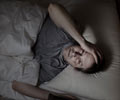A new study has discovered that the persistence of insomnia is linked to an increased risk of subsequent depression among individuals suffering from the sleep disorder.
Persistent insomnia could increase the risk of depression in young adults, a Swiss study has found.
The study, led by Jules Angst, MD, of Zurich University Psychiatric Hospital in Switzerland, was conducted on 591 young adults, through six interviews spanning 20 years with an aim to assess their psychiatric, physical, and sleep symptoms.According to the results, the researchers classified four duration-based subtypes of insomnia: one-month insomnia associated with significant distress, two-to-three-week insomnia, recurrent brief insomnia, and occasional brief insomnia.
The findings indicated that the annual prevalence of one-month insomnia increased gradually over time, with a cumulative prevalence rate of 20 percent and a greater than two-fold risk among women. Insomnia developed into more chronic forms over time in 40 percent of subjects.
It was found that insomnia either with or without comorbid depression was highly stable over time, while insomnia lasting two weeks or longer predicted major depressive episodes and major depressive disorder at subsequent interviews.
The researchers found that 17 to 50 percent of subjects with insomnia lasting two weeks or longer developed a major depressive episode in a later interview.
Besides, the researchers stated that "pure" insomnia and "pure" depression were not longitudinally related to each other, whereas insomnia comorbid with depression was longitudinally related to both.
Advertisement
He added: "We were also able to look separately at insomnia alone, depression alone, and combined insomnia-depression. The results show that insomnia seems to be followed by depression more consistently than the other way around. In addition, we found that insomnia tended to be a chronic problem that gets more persistent over time, whereas depression was a more intermittent problem."
Advertisement
The study is published in the latest issue of the journal Sleep.
Source-ANI
RAS/L











